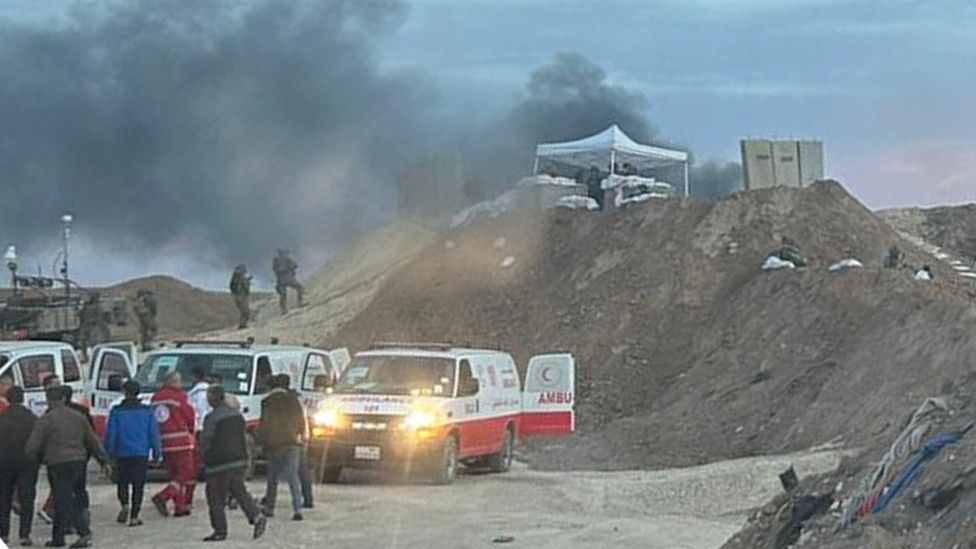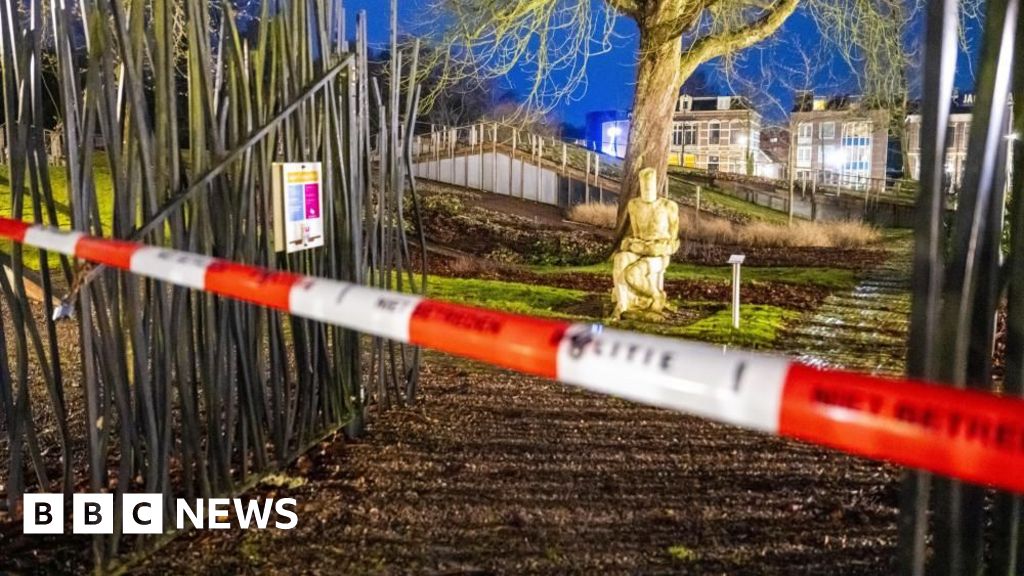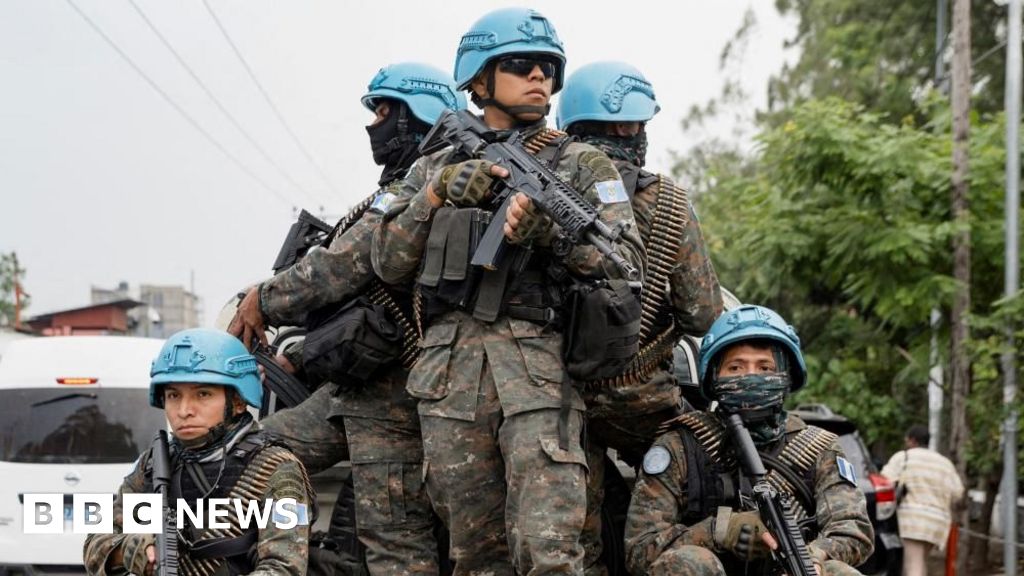ARTICLE AD BOX
 Image source, Jake Morland
Image source, Jake Morland
A British aid worker says ambulances faced a dangerous journey through Gaza beset by hold-ups - and came under fire
By Frank Gardner
BBC security correspondent in Jerusalem
The "dehumanising" treatment of paramedics, ambulances shot at, and unexploded bombs on the road.
Jake Morland, a British aid worker with the UN's Office for the Coordination of Humanitarian Affairs (OCHA), has given the BBC his eyewitness account of a high-risk mission to transfer patients under appalling conditions in Gaza.
Last Saturday, 9 December, a joint World Health Organisation (WHO)/UN/Palestine Red Crescent Society convoy of six ambulances and a truck set off from southern Gaza to deliver desperately-needed medical supplies to the al-Ahli Hospital in the north, and to transfer critically-injured patients from there to a hospital in the south.
To get to al-Ahli, the convoy had to pass through the Israel Defense Forces (IDF) checkpoint at Wadi Gaza.
"The one thing we expect when we go through a checkpoint in any military setting is free access for humanitarian personnel and goods", says Mr Morland, who previously worked in Gaza for UNRWA, the UN's agency for Palestinian refugees.
But this time, he says, "we approached huge sand dunes with Israeli soldiers standing on the top with their machine guns squarely aimed at the Palestinian paramedics, at the UN vehicles, and at the UN trucks carrying medical supplies".
As they were held there for over an hour, two of the Palestinian paramedics were led away for questioning. "We understand one was put on his knees, stripped and detained for some time until we were able to negotiate his release and carry on to Gaza," says Mr Morland.
"These moves (of aid) are clearly co-ordinated with the IDF," he says. "We provide all the details of what's on the convoy, what it's going to do, and indeed the names of all the members of the convoy… So what was really a dehumanising treatment of Palestinian colleagues was unacceptable."
From Wadi Gaza, the aid convoy pressed on north into the old city of Gaza, which Mr Morland describes as a rabbit warren of debris-strewn streets - with unexploded ordnance on the road and beside it.
"We were also shot at. The ambulance took a couple of bullets as indeed did a truck. So it really was putting humanitarian workers' lives on the line as they went to try and save lives."
On the return journey south, they were again held up at the checkpoint - but this time they were carrying 19 critically injured patients from a tiny trauma hospital in Gaza City, so every minute counted.
"All of these patients had life-critical injuries - amputations; horrific wounds that needed immediate attention. We were held for over two hours at the checkpoint. The walking wounded were forced at gunpoint from the ambulance and again were stood in the sand to be profiled by the IDF," Mr Morland recalls.
"Even the children who were wounded and terrified were carried out by the paramedics, and stood there for over an hour while pictures were taken."
Eventually, as night fell and the sound of air strikes grew closer, the group had to take a difficult decision: to leave behind one of the paramedics who was still detained by the IDF. "We had patients who were literally dying because of all the delays that were being imposed on us," says Mr Morland.
"I heard that one of the patients died from his injuries on the way to a hospital in the south. We think that may have been avoidable if we'd been allowed free and fair access through the checkpoint."
Image source, Jake Morland
Image caption,Briton Jake Morland (C) has been working in Gaza for the UN's Office for the Coordination of Humanitarian Affairs (OCHA)
We put these allegations to the IDF, who told us that one of the Palestinian paramedics was detained because he was suspected of "association with terror activities".
The IDF said they encouraged the rest of the convoy to move on south, but that of the six ambulances containing injured patients, three opted to remain with the suspect despite being encouraged to move to the southern hospital.
Regarding the patient who reportedly died, the IDF said this was only reported to them days later and they have yet to be able to independently confirm it.
For Jake Morland though, it was not just the hardship of getting a medical convoy through IDF lines that shocked him - it was what he witnessed in Gaza's al-Ahli Hospital that day.
"This is a hospital that normally treats 80 patients with 80 beds," he says. "There are currently over 200 patients in that hospital.
"They're no longer dealing with broken bones. They're now dealing with life-threatening wounds; horrific, shrapnel wounds.
"I've never seen so many people dying in front of me. They were lying on stretchers with horrific wounds next to body bags. The scenes were horrific. And yet these Palestinian paramedics and the other aid workers that go there (to northern Gaza) time and time again - at great risk to themselves - act with compassion and dignity, and help these patients, and try to bring them to safety".
Asked what the wounds were caused by, Mr Morland says: "They are just praying for the bombs to stop raining down on them in Gaza City, and they are all wounds and injuries of war. Pure and simple."
On Wednesday, the WHO put out its own statement, calling for healthcare and humanitarian aid workers to be protected.
Image source, Jake Morland
Image caption,Morland described scenes of devastation during the convoy's journey through the Palestinian territory

 1 year ago
19
1 year ago
19








 English (US) ·
English (US) ·